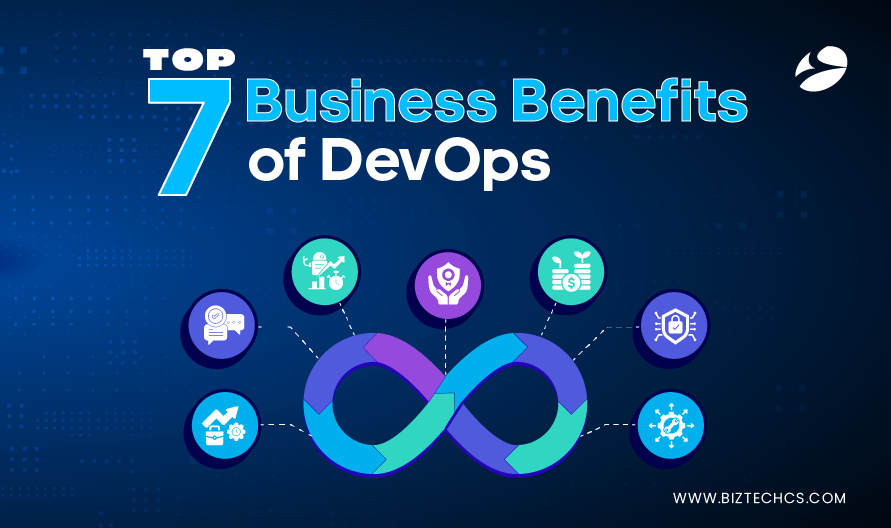3095
Top 7 Business Benefits of DevOps
26 Sep, 2024
5 min read
Table of Content

In recent years, DevOps has become the new hype and revolutionized how organizations function.
According to a Puppet report, multinational companies that practice DevOps gained a 60% advantage in terms of the time needed to bring products to the market and other KPIs.
Integration of development and operations is efficient because of the interrelation of the two teams and the power of DevOps automation.
Businesses and organizations save some $220 billion from strategic work, resulting in 22% less time spent on unplanned work and more opportunities for innovation.
Likewise, organizations noted that they incur half as many deployment failures, given that delivery is much faster. This makes it obvious why 77% of organizations use DevOps in their digital transformation process.
In this blog, we will focus on the seven main business benefits associated with implementing DevOps.
DevOps is an approach that combines development and operations to enhance communication and reduce the differences between software deployment periods.
It is designed to bridge the gaps between development and operation, helping organizations release more often and with fewer issues.
By and based on current statistics, approximately 83% of developers participate in DevOps while organizations that implement DevOps experience approximately 60% less handling time for their support cases.
The global DevOps market was $10.9 billion in 2023 and is estimated to grow to $63.4 billion by 2030, which shows how quickly this technology is being accepted in the field.
Organizations that use DevOps can avoid or counter failures 24 times faster, and failure rates are 3 times lower than in companies that do not use this method. These stats explain how DevOps helps improve efficiency and communication, and the following points explain why they are true.
The key components of DevOps include:
Combined, they let to increase the speed of cycles, release, and participate in the work of different teams.
One of the benefits of DevOps practices is time to market. DevOps enables this process by automating it and employing CI/CD tools that allow teams to release updates and new features faster. This speed enables businesses to respond to market forces and customers’ needs and feedback very efficiently.
It also provides a faster feedback loop for bug fixes or feature releases, thus enhancing the user experience.
Businesses and industries can introduce their new products to those markets before competitors.
In a tech environment where clients are constantly looking for new solutions, this short time to market enables companies to compete better and develop new products faster.
Another benefit of DevOps is that it focuses on enhancing cooperation between teams. DevOps integrates the development, operations, and quality assurance teams, eliminating stiff hulking within teams.
This teamwork aids in problem-solving since teams can adhere to issues in unison in real-time. The decentralization of responsibility fosters ownership from the product development phase to when the product is on the market.
Since it involves feedback between the different teams, issues are corrected immediately, resulting in increased efficiency.
Automation is one of the biggest advantages of DevOps and enables efficiency improvement.
When testing, configuring, or deploying resources, DevOps eliminates the likelihood of errors made by hand and time used.
Automated testing guarantees that the software release undergoes an extensive test to eliminate the issues that are most likely to be seen in the system.
IaC is a way to make work with and on the scale of infrastructure easier. Furthermore, CI/CD pipelines help to enhance the efficiency of the software delivery process and exclude the impact of monotonous tasks on the teams.
Another advantage of DevOps is the increased quality and reliability of the developed products.
DevOps employs agile testing and continuous monitoring to identify and correct bugs throughout the development process. This assists in avoiding potential complications from reaching the production stage, resulting in fewer system failures.
Automation also means equal experience within different contexts and eliminates cases where something works well in one environment but not in another, which is known as the “it works on my machine” scenario. This makes it easier for teams to tackle any looming problems, resulting in constant software releases and improved customer experience.
Increased efficiency is another advantage of DevOps because there are always ways to reduce costs.
Overall, it gives the company an understanding that work, and thus time, can be saved through automation, less manual work, and minimized interruptions.
It means there are fewer outages and they are repaired much more quickly so productivity is not lost and costs are not incurred.
Teams also reduce wastage of resources to correct mistakes since they are detected at a very early stage, through endless testing as well as communication. In the long run, this releases resources for innovations, increasing profitability.
Another significant advantage of DevOps is an improved ability to scale and adapt organizations.
Some tools that make work easier by expanding or contracting the system depending on the required capacity include the Infrastructure as Code (IaC) and scaling. This guarantees that resources are adequately provided for and that there is no wastage or slowdown when they are needed to produce goods.
Additionally, DevOps makes it easier to scale since environments from development to production are kept consistent. This flexibility helps organizations respond to market trends without necessarily significantly impacting results.
Another advantage linked with DevOps is improved security. Incorporating security at the beginning of the cycle, DevSecOps enables one to spot emerging issues before they evolve into challenges.
Introducing security checks in the CI/CD pipeline means that it can quickly identify and address mistakes.
Managing compliance is done by creating scripts to ensure standardization regardless of the amount of work that it is.
Since proactive monitoring effectively and efficiently identifies and eliminates threats, serious and expensive security breaches are unlikely.
DevOps is a set of processes that can be used to reduce the time taken to release software to the market through the interrelation of development and operations stages. Here’s a simple breakdown of its main phases:
These steps are cyclical, enabling the teams to constantly enhance the delivery of the software.
Here are a few real-world examples of DevOps success:
These companies have used DevOps to enhance speed, stability, and innovation in their services.
Adopting DevOps can be challenging for several reasons:
Here are some key future trends in DevOps, explained simply:
Low-Code/No-Code: Some aspects of application development will be made possible through tools developed from no or low code, which will enable more people to be involved in app development.
In conclusion, embracing DevOps has potential business values, such as a shorter time to release software, and organizational benefits, such as better teamwork.
They improve operational efficiency, reduce mistakes, and increase customer satisfaction through repetition. That is why, by having better scalabilities and a quicker reaction to the market signals, businesses can gain a competitive advantage.
DevOps also fosters an organizational culture of accountability and promotes innovation for sustainable development.
If you are in the process of sourcing DevOps developers, then Biztech is the company to approach since we have a team that will assist in enhancing and implementing these practices at your firm. Our experts guarantee smooth implementation and solutions perfectly suited to your business.
DevOps is an approach that entails coordinating development and operations to streamline the processes involved in software delivery. It benefits business development by enhancing the speed and quality of product delivery and cutting the chances of incorporating a mistake.
Yes, DevOps practices can be adopted in non-technical fields to embrace change and implement improved working methods in other sectors, such as production, supply chain, and even services.
DevOps is cost-effective for it enables the use of automation to handle tasks that would otherwise require human attention, it reduces time spent on downtime hence minimizing the instances when professionals have to be contacted. This makes it possible to reduce errors and shorten the time taken to solve problems hence reducing the overall operational costs.
DevOps entails cross-functional teamwork where the working teams have close coordination and work towards the achievement of common objectives. This results into efficient processes, quick issue resolution, and improved cooperation within the firm.

Storyblok
21383
By Devik Gondaliya
02 Apr, 2025

Storyblok
22358
By Devik Gondaliya
01 Apr, 2025

Storyblok
23094
By Devik Gondaliya
27 Mar, 2025